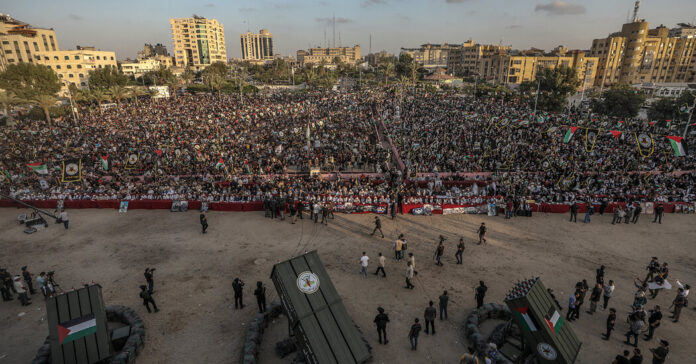Israel’s killing of a young commander of the local branch of Palestinian Islamic Jihad in the West Bank city of Tulkarm is shining a spotlight on the group.
Here’s a closer look.
What is Palestinian Islamic Jihad?
Formally titled the Islamic Jihad Movement in Palestine, the group was founded in the Gaza Strip in the 1980s to fight the Israeli occupation. It has a presence in both Gaza and the West Bank, and dominates the part of Tulkarm that was founded as a refugee camp for Palestinians displaced in the wars surrounding the foundation of Israel.
Like Hamas, it is a Sunni Muslim group, though far smaller. And also like Hamas, the group receives funding and weapons from Shiite Muslim Iran, in pursuit of their shared anti-Israel ideology. Israel, the United States and the European Union consider both groups to be terrorist organizations.
The U.S. Counterterrorism Center says Palestinian Islamic Jihad has also received support from Syria and Hezbollah in Lebanon.
The U.S. State Department in 2022 put the group’s membership between 1,000 and several thousand.
Who heads the organization?
Ziyad al-Nakhalah has led the group’s leadership council since 2018. Mr. al-Nakhalah was staying in a guesthouse room next to Ismail Haniyeh, formerly a top leader of Hamas, when Mr. Haniyeh was assassinated earlier this month by a bomb in Tehran.
What is its mission and philosophy?
According to the Council on Foreign Relations, the group “wants to reestablish a sovereign, Islamic Palestinian state,” and views “the Arab-Israel conflict as an ideological war, not a territorial dispute.” Palestinian Islamic Jihad opposes a two-state solution.
While the group holds less sway than Hamas, experts say the group is more extreme in ideology. “Historically, they’ve had a top-down view of establishing an Islamic state,” said Daniel Byman, a counterterrorism specialist at Georgetown University. “You grab power, and then you force people to be good Muslims, as opposed to teaching.”
What is the relationship between Palestinian Islamic Jihad and Hamas?
The two are sometimes allied but operate independently: Islamic Jihad focuses on military attacks and has far fewer political and social institutions than Hamas, which won elections in Gaza in 2006, drove its rivals out of the territory the following year and has ruled there since.
The groups have typically cooperated in their opposition to Israel, but tensions have arisen at times when Hamas has put pressure on Palestinian Islamic Jihad to stop attacks against Israel, experts said. Unlike other militant Palestinian groups, Islamic Jihad has been reluctant to engage in negotiations or be part of a diplomatic solution to the current war with Israel.
Did Palestinian Islamic Jihad play a role in the Oct. 7 attacks?
Yes, the group claimed responsibility for some of the attacks, and a United Nations report published in June said the group had taken part in the violence on Oct. 7.
The report specified that Palestinian Islamic Jihad had participated in these episodes:
-
An attack on Kibbutz Be’eri, where more than 100 people were killed and about 30 were abducted.
-
An attack on Kibbutz Nir Or, which left more than 45 dead and saw more than 70 abducted.
-
Attacks on military bases, including the Nahal Oz outpost, where 66 soldiers were killed.
What are other notable attacks involving Palestinian Islamic Jihad?
The group has attacked both military and civilian targets. In over a three-day span in August 2022, the group launched over 1,000 rockets at Israel in a deadly clash that ended in a cease-fire brokered by Egypt.
U.S. and Israeli intelligence officials also blamed an errant rocket fired by the group for an explosion at Al-Ahli Arab Hospital in Gaza City last October that killed scores of people.
What military capabilities does the group have?
Palestinian Islamic Jihad’s military wing, Al Quds Brigade, has been carrying out small-scale attacks since at least the late 1980s. It conducted suicide bombings over decades, and more recently has used small arms, rockets and mortars against Israel. Mr. Byman said that Palestinian Islamic Jihad tended “to be relatively low-level in terms of technology and in terms of the size of their arsenals.”
Read More: What Is Palestinian Islamic Jihad?


